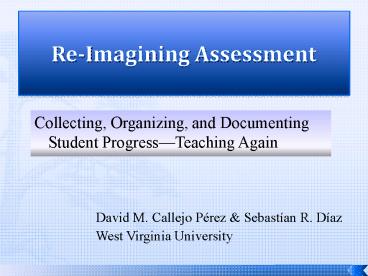ReImagining Assessment - PowerPoint PPT Presentation
1 / 18
Title:
ReImagining Assessment
Description:
Triangulating Evidence of Skill and Competency. Cross-Checking Data. Data-based Decision Making ... series of authentic conversations, which are public and open. ... – PowerPoint PPT presentation
Number of Views:24
Avg rating:3.0/5.0
Title: ReImagining Assessment
1
Re-Imagining Assessment
- Collecting, Organizing, and Documenting Student
ProgressTeaching Again
- David M. Callejo Pérez Sebastían R. Díaz
- West Virginia University
2
Essential Assessment Principles
3
New Assessment in Education A Proposition
- The tasks used to assess what the students know
and can do need to reflect the tasks they will
encounter in the world outside schools, not those
limited to schools themselves. - The tasks used to assess students should reveal
how students go about solving a problem, not only
the solutions they formulated. - Assessment tasks should reflect the values of the
intellectual community from which they are
derived. - Assessment tasks need not be limited to solo
performance. Many of the most important tasks we
undertake require group efforts.
4
New Assessment in Education A Proposition
- Assessment tasks should think about more than one
possible solution and one possible answer to a
problem. - Assessment tasks should have curricular
relevance, but limited by the curriculum itself. - Assessment tasks should require students to
display a sensitivity to configurations or
wholes, not simply discrete elements. - Assessment tasks should permit the student to
select a form of representation they choose to
use to display what has been learned.
5
Meeting Basic Human Needs
- We need to feel competent.
- We need to feel we belong.
- We need to feel useful.
- We need to feel potent.
- We need to feel optimistic.
6
Recognizing Developmental Changes
- Assessment is the process of gathering evidence
of learningintegrated with the Curriculum.
Examples include - social Interchanges
- cooperative work
- written and oral responses
- creative work
- recreation
- activities in and out of school
- and interpersonal skills
7
Recognizing Developmental Changes
- Teachers assess learning when they
- Clear understanding of learning goals/outcomes
- Relate these understandings to their students
- Construct learning activities that yield rich
assessment data - Incorporate assessment information into
descriptive feedback to increase students
understanding of the learning experience - Adjust teaching, goals, objectives, approaches
based on findings from ongoing research - Teach students to assess themselves to initiate
some metacognitive processes - Develop students ability to articulate their
current level of knowing
8
Recognizing Developmental Changes
- Suggestions for developing school wide strategies
to develop and use assessment - Workshops that build on teachers interests and
knowledge - Team meeting where teachers/administration
discuss student learning and assessment - Individual study, classroom practice, and
reflection
9
Are they Learning?
10
Impact of Learning Five Casesfrom P. Jones J.
Carr R. Ataya (Eds.). (2008). A Pig Dont
Get Fatter the More you Weigh it.
- Linguistically Diverse Learners
- Impact of language and culture on learning.
- Developmentally Diverse Learners
- NCLB and Special Education.
- Policy Considerations
- Legislation, law, and contexts of educational
language - Technical Considerations
- Validity and Reliability of Assessment
- Involving Parents
- Who are they if children are diverseAre their
parents not diverse too?
11
Evidence of Thinking
- What Constitutes Evidence of Thinking?
- Thinking Made Visible
- Gathering Thinking Evidence
- Daily Anecdotal Notes
- Parents as Co-Observers
- Student Records of Thinking Evidence
- Written Reflections
- Multiple Successful Performances
- Organizing and Storing Data Effectively
- Considerations for Diverse Populations
12
Work Samples
- What is Student Work? It is more than
benchmarks, it is the foundation of growth toward
standards. - Significance is not determined by the size but by
what it represents. Worthy artifacts can show - Breakthroughs or ahasskills or strategies that
were confused are now performed well. - Solid demonstration of a target goal
- Unique insights
- Creative thinking
- Problem solving
- Connections made to self, others, texts, world
- Diverse Populations require diverse work samples.
13
In-Classroom Benchmarks
- Criterion-Referenced Measures
- Compares the student to the instructional aim,
rather than to others (Norm-Reference Test) - Teacher-created tests can be more accurate
because of the teacher-student relationship - Running Records
- Rubrics
- A Retelling Rubric and Holistic Journal Rubric
- Formative and Summative Rubrics
- Present the Evidence
14
Formative Assessment
- According to James Popham (2008) in
Transformative Assessment, there are 4 levels in
formative assessment
15
Analyzing and Evaluating Data
- Triangulating Evidence of Skill and Competency
- Cross-Checking Data
- Data-based Decision Making
- Dealing with Unmet Standards
- Examine Time Management
- Are Learning Opportunities Appropriate?
- Seek Alternative Data Sources
- Reporting Acquisition
16
Reporting Achievement and Planning the Next Step
- What Does it Mean? Educational Threads.
17
Social Contract of Assessment
- Social Compact of Assessment
- Assessment is a process, a series of authentic
conversations, which are public and open. - Learners
- Teachers
- Administrators
- Community
- Politicians
18
Social Contract of Assessment
- Stakeholders need to value an open community
based upon ideals in which freedom of expression
is protected, civility is affirmed, and
appreciation and understanding of individual
differences are honored where we value a caring
community in which the well being of each person
is important.































